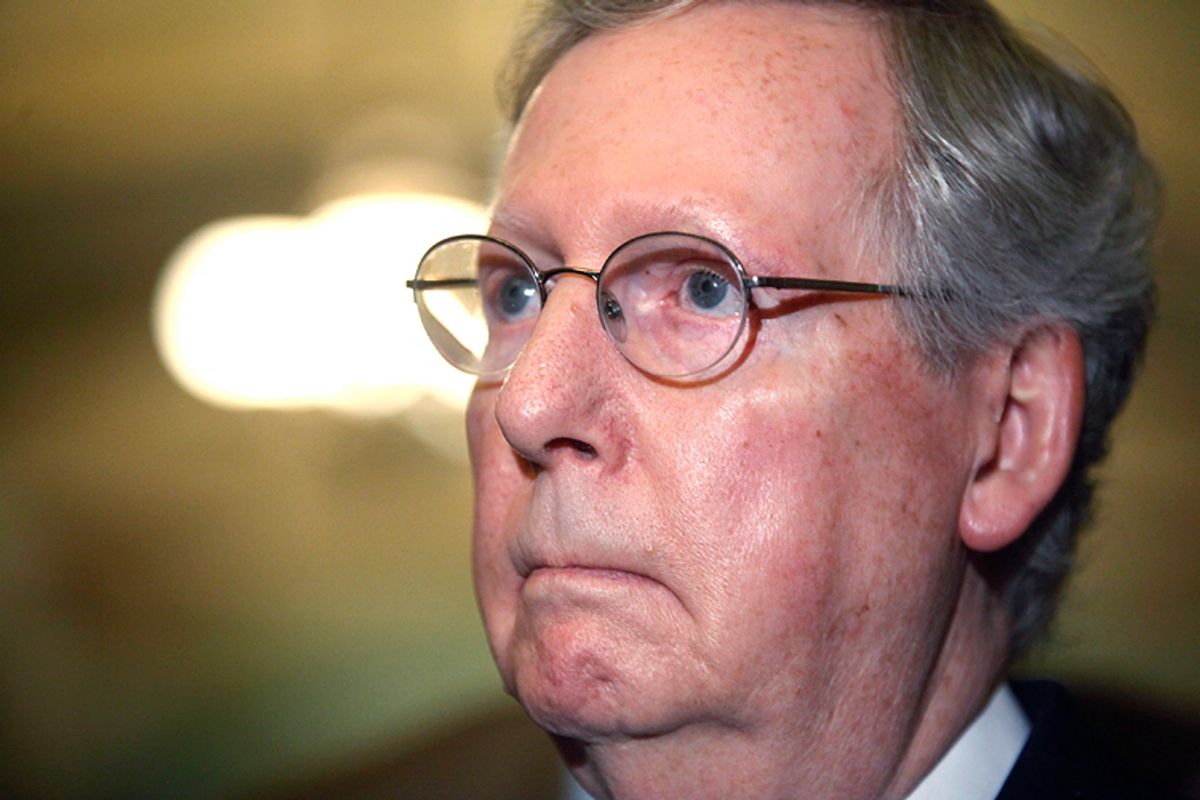Back in 2013, when Healthcare.gov was broken and the Affordable Care Act faced a grimly uncertain future, I imagined a future in which Obamacare rolled into a disaster mitigated only by the existence of a few bright spots -- the states that had competently developed their own exchanges and were successfully expanding coverage, untethered from the horrendous rollout of the federal marketplace.
Most of those were reliably liberal states like California and Connecticut. But one of them was Kentucky, whose Democratic Gov. Steve Beshear had singlehandedly expanded the state's Medicaid program and built one of the best functioning enrollment websites in the country.
When I wrote this article in mid-November, Healthcare.gov signups were embarrassingly low, but Kentucky had accepted President Obama's offer to allow insurers to reinstate canceled plans and was already reducing its uninsured population. Under the circumstances, I wondered what this all meant for Mitch McConnell. As Senate Republican leader, and a contender in a nasty primary, he was obligated to redouble his commitment to repeal the Affordable Care Act. But as a general election candidate and the senior senator from Kentucky, he would have an obligation to offer his constituents more than an open-ended pledge to return tens of thousands of state residents to the ranks of the uninsured.
McConnell’s current position — his position for the past three and a half years — is that the law “needs to be eliminated and we need to start over.”
But before Obamacare, over 17 percent of non-elderly Kentuckians were uninsured. If Obamacare knocks that figure into the single digits next year…how long will his position hold? His leadership role is about to come into exquisite tension with his responsibility to his own constituents.
I think that moment is finally upon us.
Kentucky says it booked 77,044 enrollments in private qualified health plans and 286,222 Medicaid enrollments through March 31. A total of more than 360,000 through Kynect (the state's exchange) alone. State officials confirmed to me Wednesday that the numbers do not include enrollments through outside channels, and that their preliminary analysis suggests that 75 percent (or more than 270,000) were previously uninsured.
That's over 40 percent of the state's entire uninsured population. If the number holds and improves then Obamacare has already reduced the state's total, and non-elderly, uninsurance rate from double to single digits. And McConnell's position is that the double-digit number should return. That's probably not quite as politically unsupportable as, say, advocating a direct increase in the unemployment rate, but generally speaking it is not advisable politics.
Of course, Kentucky hasn't elected a Democratic senator in over 20 years. It's a conservative state, and McConnell might be able to get away with it. But you can see how in other states, over time, and maybe sooner than later in Kentucky, the repeal proposition will collapse.
This view of things places other states' refusal to expand Medicaid in a new and extraordinarily political light. In general, the governors who have refused the Medicaid expansion have done so out of a combination of conviction, personal ambition and spite. But in states like Louisiana and North Carolina the effect has been to deny Democratic incumbents the ability to tout a coverage expansion as extraordinary as Kentucky's. Or, more effectively, attack opponents for proposing to nearly double the uninsurance rate.
Sen. Mary Landrieu, D-La., for instance, is attacking Louisiana Gov. Bobby Jindal for not expanding Medicaid. He's extremely unpopular in the state and that makes him a useful foil. But I wonder if she wouldn't prefer to be able to say that her opponent wants to take insurance away from hundreds of thousands of residents. Fight him to a draw on Obamacare, and let all the other issues dominate the campaign.
Kentucky did unusually well. It had a high uninsurance rate to begin with, and seems to have done a better job isolating that population than other states. Seventy five percent will be hard for any state to match. But Alaska, Lousiana and North Carolina actually have higher uninsurance rates than Kentucky did. And though Obamacare most likely reduced those rates somewhat, those races would be cast in different light if the effect had been several times as large.

Shares